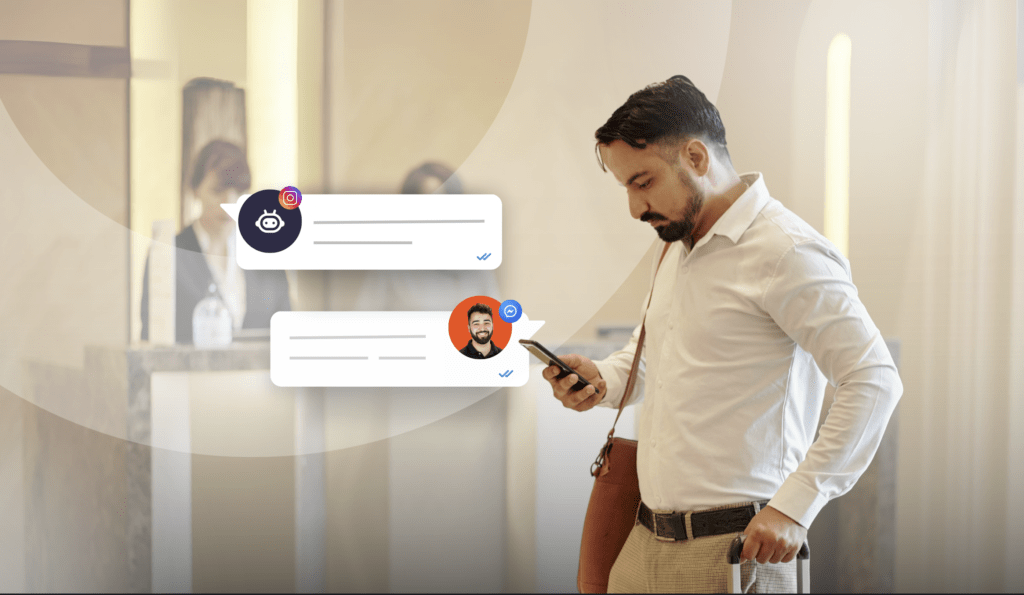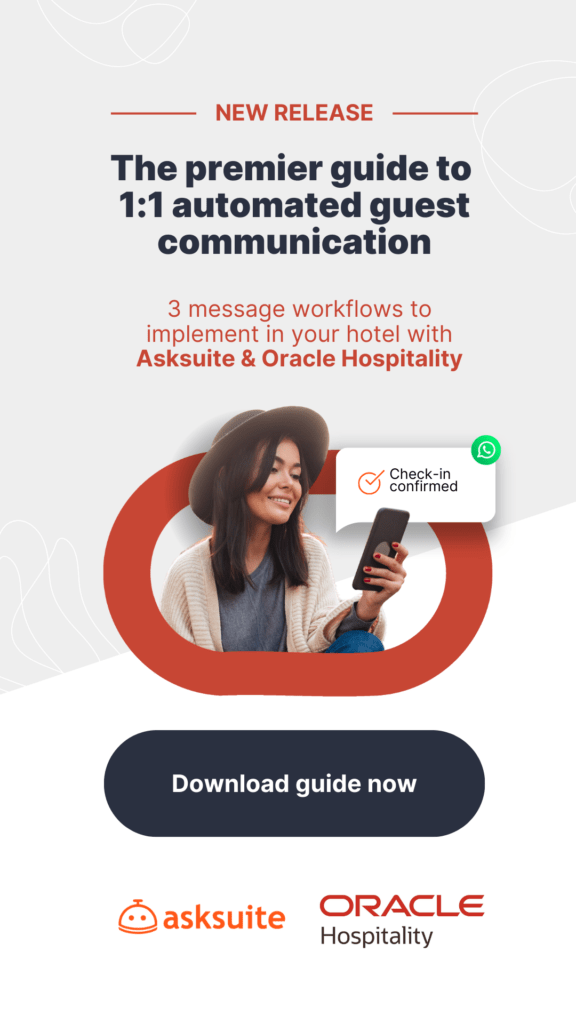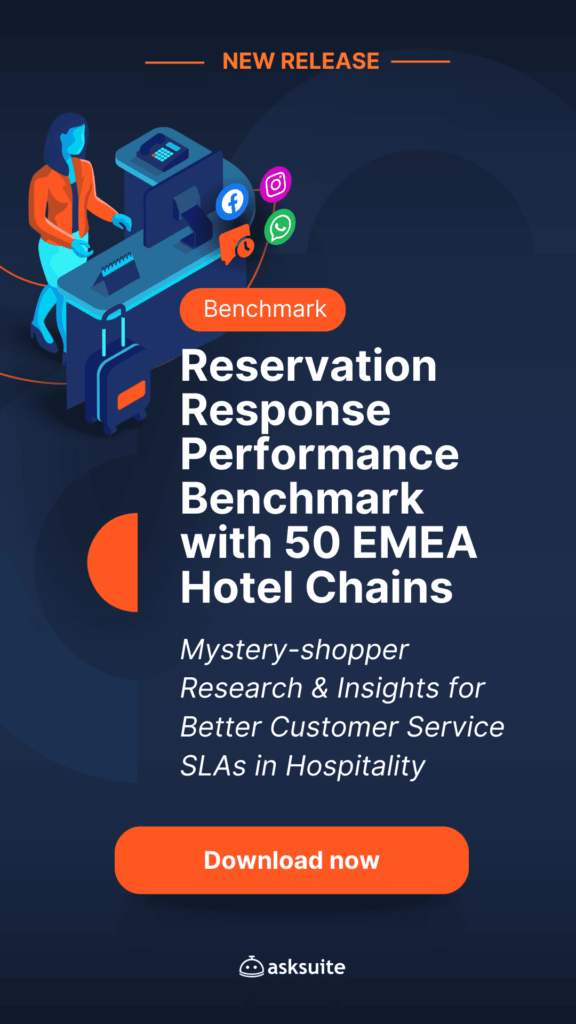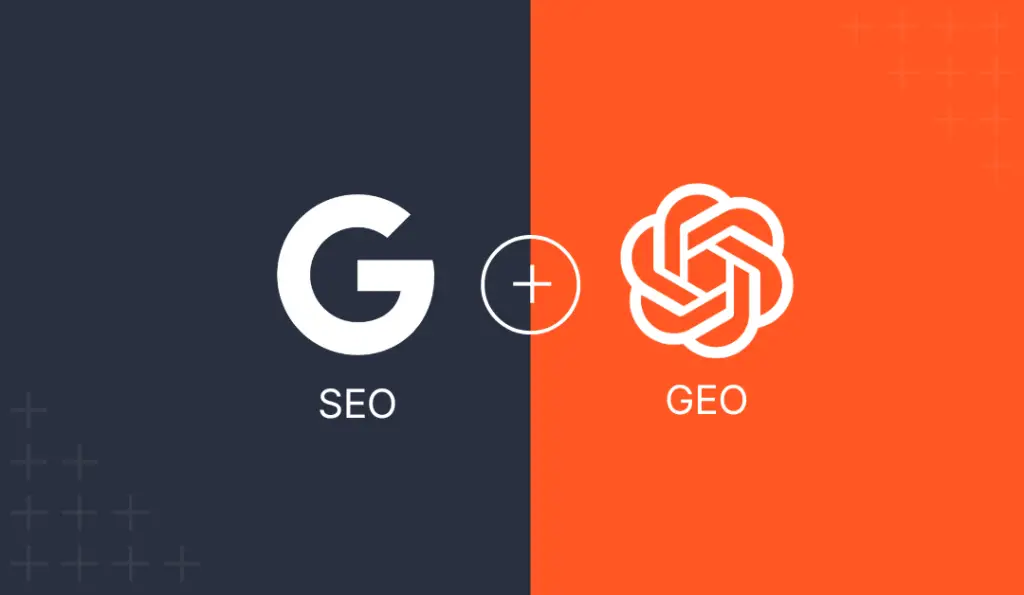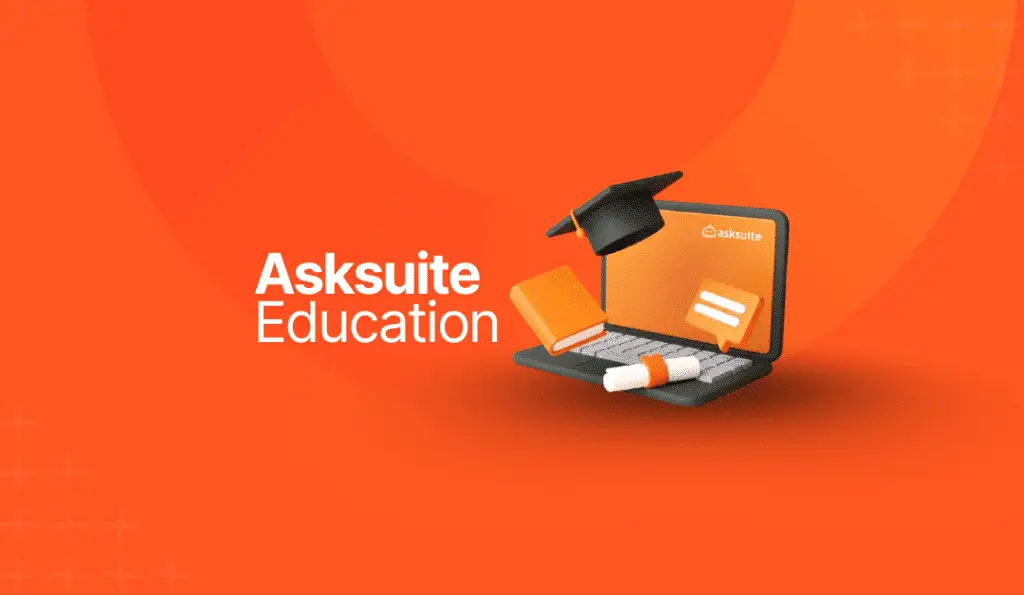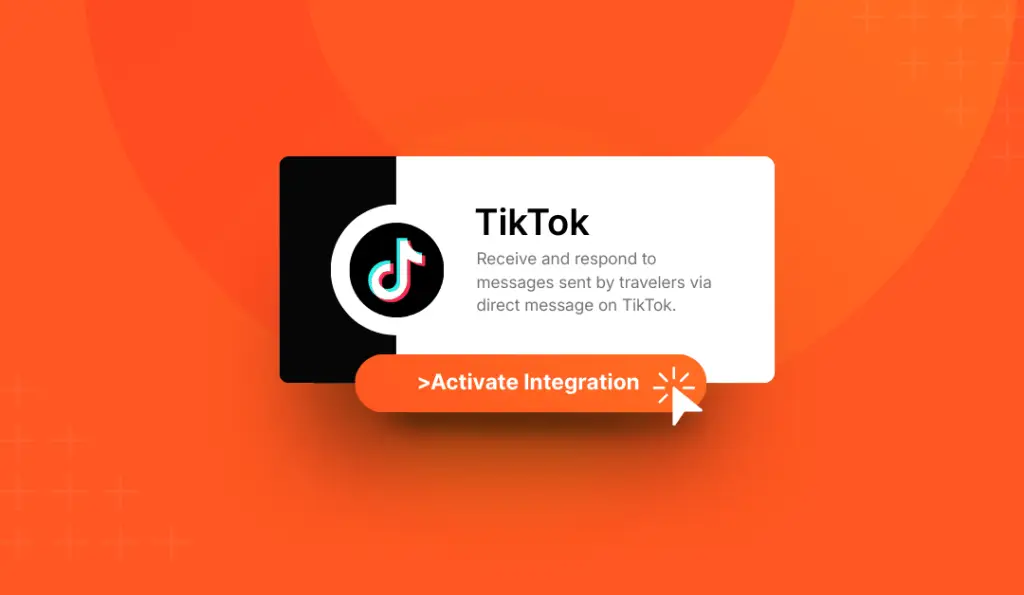Discover how implementing a hotel chatbot can streamline communication, enhance the traveler experience, and drive more direct bookings.
Hotels are constantly looking for ways to improve operational efficiency and strengthen guest experiences. Instant communication is now essential for hotels. Potential guests expect quick responses, personalized communication, and seamless booking experiences across every channel. Falling short of these expectations can result in lost revenue and harm your brand reputation.
Whether you’re aiming to reduce operational costs with communication, provide 24/7 support, or increase revenue, this ultimate guide will help you understand how a hotel chatbot can be a game-changer and why more hotels are adopting this technology to rev up their bottom line.
What Is a Hotel Chatbot?
A traditional hotel chatbot is a conversational software designed specifically for the hospitality industry, simulating a human conversation to provide instant, automated responses to potential guest inquiries. Integrated into hotel websites, booking engines, and messaging platforms, these chatbots can handle routine tasks such as answering FAQs, providing room details, or assisting with basic bookings.
Unlike basic chatbots that rely on rigid decision trees and predefined scripts, a hotel chatbot powered by generative AI – like Asksuite’s Sophia – leverages advanced natural language understanding (NLU) to manage complex, multi-turn conversations and deliver accurate, contextual responses—helping hotels reduce manual workload, improve traveler communication, and drive more direct bookings.
What Are the Key Benefits of Using AI-powered Hotel Chatbots?
Hotel chatbots fueled by generative AI offer a range of value that can enhance potential guest interactions and streamline hotel communications. Here are the key advantages of using an AI-driven chatbot in your hotel:
Faster Traveler Responses (Even Off-Hours)
AI chatbots handle guest inquiries instantly, ensuring no traveler has to wait for a response. You can personalize each interaction by calling the traveler by name from the very first message, whether via WhatsApp or other messaging platforms. Plus, you can easily customize the tone of voice to match your hotel’s brand personality.
Real-Time Multilingual Support
The IA reservation assistant’s built-in multilingual capabilities enable it to provide real-time support in multiple languages, making it easy to communicate with international travelers without the need for additional staffing. This establishes a seamless experience for travelers from all over the world.
Increase in Direct Booking Conversions
It helps improve direct booking rates by providing instant responses and booking assistance, guiding travelers smoothly through the reservation process. This reduces the dependency on OTAs (Online Travel Agents) and boosts your hotel’s profits.
Context Understanding
The AI reservation assistant is capable of understanding the context of each conversation, allowing it to provide relevant, accurate answers even to more complex queries. This contextual awareness leads to a smoother and more intuitive potential guest experience.
Audio transcription
The assistant also has an audio transcription feature, converting voice messages or phone calls into text. This prevents miscommunication, enabling guests to easily switch between voice and text interactions for convenience
How to Choose the Best AI Chatbot for Hotel Communication
Selecting the right AI chatbot for your hotel is crucial for improving communication efficiency and traveler experiences. Here’s a checklist to help guide your decision:
1. Integration with Hotel Systems
Confirm that the chatbot integrates with your PMS, CRM, and booking systems for smooth data flow and a unified traveler experience.
2. Scalability and Adaptability
Choose a chatbot that adapts and improves over time, handling increased traveler inquiries during peak seasons while continuously learning from interactions.
3. Customization and Branding
Pick a chatbot that allows you to customize its tone, responses, and workflows, guaranteeing it aligns with your hotel’s brand and delivers consistent communication.
4. Dashboards and Analytics
Look for a chatbot with real-time analytics that provides actionable insights to monitor:
- Performance Tracking: response times, SLA compliance, resolution rates, and conversion funnels by channel and agent.
- Guest Behavior Analysis: most common inquiries, peak interaction times, booking intent signals, and drop-off points in the guest journey.
- Revenue Insights: direct bookings attributed to the chatbot, upsell/cross-sell performance, and ROI measurement.
5. Automation vs. Human Interaction
Make sure the chatbot can handle routine tasks and escalate complex queries to human agents when necessary, supporting your team and improving capabilities.
While booking assistance is a core feature, a hotel chatbot should also act as a copilot for your agents. It should support your staff by handling routine tasks, providing intelligent recommendations, and seamlessly escalating more complex inquiries to human agents when necessary.
Check out our Hotel Systems Integration Checklist to make sure your systems are working together optimally.
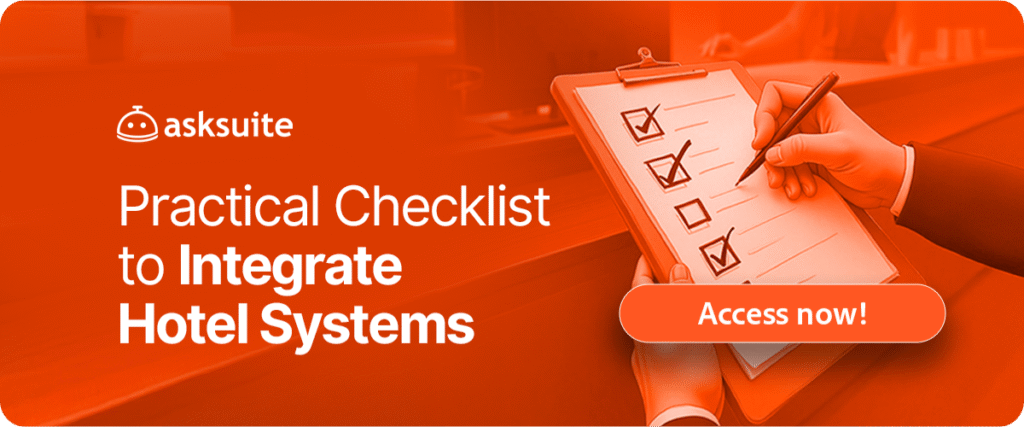
Why More Hotels Are Turning to Chatbots
The hospitality industry is rapidly embracing AI-driven chatbots as a solution to meet growing potential guest expectations and streamline communication. Here’s why more hotels are turning to chatbots:
- AI Adoption: Did you know that 70% of travelers expect to communicate with hotels via AI tools like chatbots? More than just automating repetitive tasks, AI is already enhancing guest experiences with 24/7 instant, multilingual, and personalized support. For modern travelers, seamless digital communication is no longer optional, it’s expected.
- Traveler Expectations: Today’s travelers expect digital-first service. Whether it’s booking a room, asking about amenities, or making requests during their stay, travelers want fast, personalized messages at their fingertips. Hotel chatbots help meet these demands.
- Communication Efficiency: Hotels are increasingly looking to reduce labor costs and improve communication, and chatbots provide a cost-effective way to manage traveler communication. By automating frequent inquiries, chatbots free up hotel staff to focus on higher-priority tasks and personalized interactions.
Key Steps to Implementing a Hotel Chatbot
Implementing an AI-powered hotel chatbot can transform your traveler experience and streamline communication. Here are the key steps to a successful implementation:
- Define Goals and Objectives: Start by clearly defining the goals you want to achieve with your chatbot. Is it to increase direct bookings, improve potential guest satisfaction, or reduce operational costs with communication? Setting clear objectives will help you tailor the chatbot’s features to meet your hotel’s specific needs.
- Align Your Team: Successful chatbot implementation requires alignment across multiple teams, including IT, marketing, reservations, and customer service. Ensure all departments are on the same page and understand how the chatbot will integrate into existing systems (PMS, CRM, booking engines).
- Choose the Right Tech: Selecting the chatbot platform that’s the best fit is crucial. Opt for a solution which is specifically built for the hospitality industry. Make sure the chatbot integrates seamlessly with your hotel systems and offers the necessary AI capabilities and customization options.
- Customize and Set Up: Customize your chatbot’s tone, and responses to match your hotel’s brand and style. Set up the chatbot to handle common traveler inquiries, booking assistance, and special requests. Be sure it has multilingual support to cater to international guests.
- Test and Train: Before going live, run extensive testing to double-check the chatbot functions correctly and meet potential guest expectations. During this phase, fine-tune its responses, test integration with your systems, and gather feedback from internal teams to address any issues.
- Launch and Monitor: After testing, launch the chatbot and closely track its performance. Analyze metrics like response time, conversion rates, and traveler satisfaction to gauge its effectiveness. Continuously optimize the chatbot based on real-time feedback and data.
By following the right steps, you’re guaranteed a smooth and successful chatbot launch. At Asksuite, our onboarding team makes the process easy, fast, and tailored to your hotel, so you start seeing results from day one.
Ready to Level Up Your Hotel’s Communication and Increase Direct Bookings with an AI-powered Chatbot?
As highlighted in this post, implementing an AI-powered hotel assistant, like Asksuite’s Sophia, can revolutionize the traveler experience, upgrade communication competency, and drive direct bookings. From handling 24/7 guest inquiries to providing personalized responses and multilingual support, Sophia AI integrates seamlessly with your hotel’s systems.
Request a demo now to see how it can take your hotel’s communication to new heights.

This blog post was originally written on October 17, 2019 and updated on September 24, 2025.
